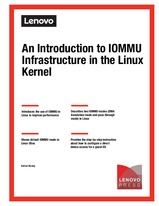Author
Published
20 Apr 2021Form Number
LP1467PDF size
21 pages, 488 KBAbstract
The Input-Output Memory Management Unit (IOMMU) is a component in a memory controller that translates device virtual addresses (can be also called I/O addresses or device addresses) to physical addresses. The concept of IOMMU is similar to Memory Management Unit (MMU). The difference between IOMMU and MMU is that IOMMU translates device virtual addresses to physical addresses while MMU translates CPU virtual addresses to physical addresses.
This paper explains the IOMMU technology, providing a high-level overview of IOMMU and IOMMU infrastructure in Linux kernel. Two IOMMU kernel modes (DMA translation mode and pass-through mode) are then described in detail. The last section of the white paper illustrates IOMMU use case with the PCI pass-through device in virtualization environment.
This paper is intended for IT specialists who want to know the difference between IOMMU DMA translation mode and IOMMU pass-through mode by means of the high-level overview, and should have knowledge of how to configure the Linux kernel and a familiarity with virtualization technologies such as KVM and Xen. The paper is also suitable for software developers who want to know the Linux kernel IOMMU subsystem, and it is recommended that they already have kernel development experience and knowledge of how MMU works.
Table of Contents
Introduction
IOMMU Subsystem in Linux Kernel
Linux Kernel IOMMU: DMA Translation Mode versus Pass-through Mode
Direct Device Access Use Case in Virtualization Environment
Summary
Acronyms
References
To view the document, click the Download PDF button.
Configure and Buy
Full Change History
Course Detail
Employees Only Content
The content in this document with a is only visible to employees who are logged in. Logon using your Lenovo ITcode and password via Lenovo single-signon (SSO).
The author of the document has determined that this content is classified as Lenovo Internal and should not be normally be made available to people who are not employees or contractors. This includes partners, customers, and competitors. The reasons may vary and you should reach out to the authors of the document for clarification, if needed. Be cautious about sharing this content with others as it may contain sensitive information.
Any visitor to the Lenovo Press web site who is not logged on will not be able to see this employee-only content. This content is excluded from search engine indexes and will not appear in any search results.
For all users, including logged-in employees, this employee-only content does not appear in the PDF version of this document.
This functionality is cookie based. The web site will normally remember your login state between browser sessions, however, if you clear cookies at the end of a session or work in an Incognito/Private browser window, then you will need to log in each time.
If you have any questions about this feature of the Lenovo Press web, please email David Watts at dwatts@lenovo.com.

